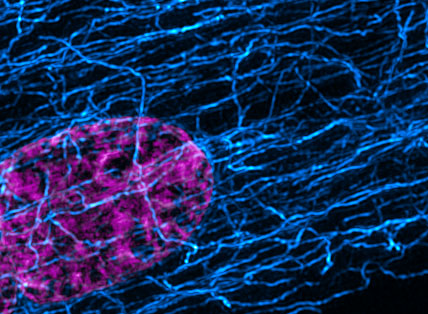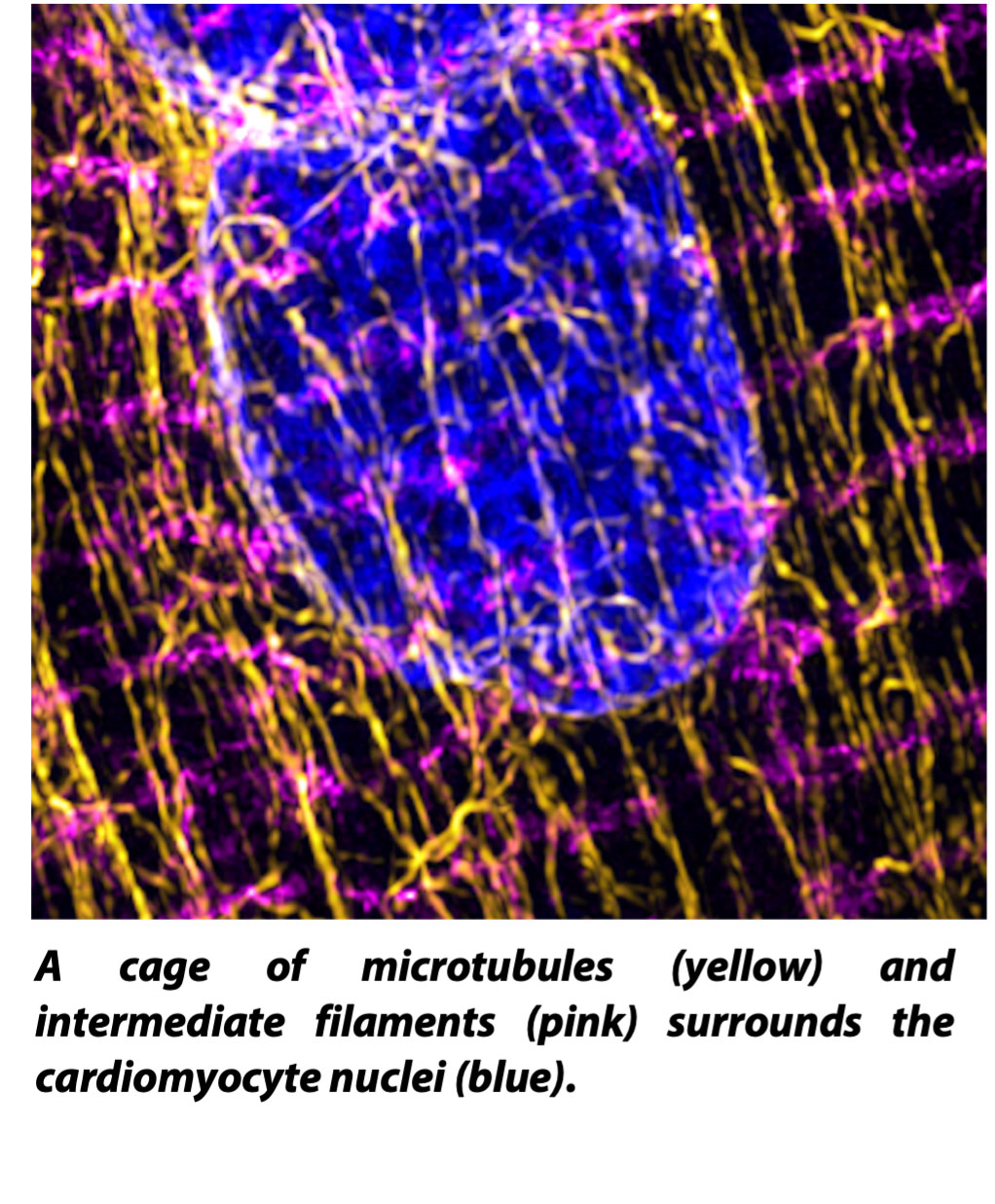
Mechanobiology
Since the 19th century we’ve known that high blood pressure is linked to pathological cardiac remodeling. Myocytes respond to altered loads by growing in thickness or length, and if unchecked this leads to dysfunction and heart failure. Yet after a century of research, we know very little about how a myocyte senses a change in force and transduces that to a cellular response.
A flurry of elegant studies – mainly conducted in non-muscle cells – shows that force can be transmitted through the cytoskeleton to affect nuclear remodeling, chromatin architecture and gene expression. But this field of nuclear mechanobiology is young, and little has been done in the myocyte, despite its fundamental importance and unique mechanical niche.
We seek to define 1) the cytoskeletal conduits for force transmission to the nucleus during the contractile cycle, 2) how force regulates chromatin architecture and gene expression in beating cardiomyocytes, 3) how genetic variants that compromise nuclear mechanotransduction lead to disease (i.e. laminopathies).
To accomplish these aims we use custom engineered systems to precisely control stress and strain on myocardial cells and tissue. We combine this with super-resolution microscopy to reveal sub-cellular responses to changing mechanical loads. We marry these single cell biophysical approaches with “omic” level assays chromatin architecture and clinical data to integrate our understanding. We rely on animal models for genetic control, but devote equal effort to functional studies in human myocytes and engineered human myocardium to ensure relevance and foster translation.
Our lab catalyzes a unique interface between the Penn Cardiovascular Institute (CVI), Penn Muscle Institute (PMI), and the Center for Engineering Mechanobiology (CEMB). We fuse this expertise to tackle clinically vital applications with single molecule precision, with the goal of transformative insight into how the heart responds to force.

Related Publications
An unbiased screen identified the Hsp70-BAG3 complex as a regulator of myosin binding protein C3
Thompson AD, Wagner MJ, Rodriguez J, Malhotra A, Vander Roest S, Lilienthal U, Shao H, Vignesh M, Weber K, Yob JM, Prosser BL, Helms AS, Gestwicki JE, Ginsburg D, Day SM.
J Am Coll Cardiol Basic Trans Science, 2023 Aug2;8(9):1198-1211. Epublished DOI: 10.1016/j.jacbts.2023.04.009.
Big tau aggregation disrupts microtubule tyrosination and causes myocardial diastolic dysfunction: from discovery to therapy
Luciani M, Montalbano M, Troncone L, Bacchin C, Uchida K, Daniele G, Wolf BJ, Butler HM, Kiel J, Berto S, Gensemer C, Moore K, Morningstar J, Diteepeng T, Albayram O, Abisambra JF, Norris RA, Di Salvo TG, Prosser BL, Kayed R, del Monte F.
Eur Heart J, 2023 May 1;44(17):1560–1570. PMID: 37122097. doi: 10.1093/eurheartj/ehad205.
Desmin intermediate filaments and tubulin detyrosination stabilize growing microtubules in the cardiomyocyte.
Salomon AK, Phyo SA, Okami N, Heffler J, Robison P, Bogush AI, Prosser BL.
Basic Res Cardiol. 2022 Nov 3;117(1):53. PMID: 36326891. doi: 10.1007/s00395-022-00962-3.
Extracellular stiffness induces contractile dysfunction in adult cardiomyocytes via cell-autonomous and microtubule-dependent mechanisms.
Vite A, Caporizzo MA, Corbin EA, Brandimarto J, McAfee Q, Livingston CE, Prosser BL, Margulies KB.
Basic Res Cardiol. 2022 Aug 25;117(1):41. PMID: 36006489. doi: 10.1007/s00395-022-00952-5.
The microtubule cytoskeleton in cardiac mechanics and heart failure.
Caporizzo MA, Prosser BL.
Nat Rev Cardiol. 2022 Jun;19(6):364-378. Epub 2022 Apr 19. PMID: 35440741. doi: 10.1038/s41569-022-00692-y. Review.
Cardiomyocyte Microtubules: Control of Mechanics, Transport, and Remodeling.
Uchida K, Scarborough EA, Prosser BL.
Annu Rev Physiol. 2022 Feb 10;84:257-283. doi: 10.1146/annurev-physiol-062421-040656. Epub 2021 Oct 6. PMID: 34614374. Review.
Need for Speed: The Importance of Physiological Strain Rates in Determining Myocardial Stiffness.
Caporizzo MA, Prosser BL.
Front Physiol. 2021 Jul 30;12:696694. eCollection 2021. PMID: 34393820. doi: 10.3389/fphys.2021.696694.
X-ROS Signaling Depends on Length-Dependent Calcium Buffering by Troponin.
Limbu S, Prosser BL, Lederer WJ, Ward CW, Jafri MS.
Cells. 2021 May 13;10(5):1189. PMID: 34068012. doi: 10.3390/cells10051189.
Cochlear supporting cells require GAS2 for cytoskeletal architecture and hearing.
Chen T, Rohacek AM, Caporizzo M, Nankali A, Smits JJ, Oostrik J, Lanting CP, Kücük E, Gilissen C, van de Kamp JM, Pennings RJE, Rakowiecki SM, Kaestner KH, Ohlemiller KK, Oghalai JS, Kremer H, Prosser BL, Epstein DJ.
Dev Cell. 2021 May 17;56(10):1526-1540.e7. Epub 2021 May 7. PMID: 33964205. doi: 10.1016/j.devcel.2021.04.017.
Microtubules orchestrate local translation to enable cardiac growth.
Scarborough EA, Uchida K, Vogel M, Erlitzki N, Iyer M, Phyo SA, Bogush A, Kehat I, Prosser BL.
Nat Commun. 2021 Mar 11;12(1):1547. PMID: 33707436. doi: 10.1038/s41467-021-21685-4.
Pathogenic LMNA variants disrupt cardiac lamina-chromatin interactions and de-repress alternative fate genes.
Shah PP, Lv W, Rhoades JH, Poleshko A, Abbey D, Caporizzo MA, Linares-Saldana R, Heffler JG, Sayed N, Thomas D, Wang Q, Stanton LJ, Bedi K, Morley MP, Cappola TP, Owens AT, Margulies KB, Frank DB, Wu JC, Rader DJ, Yang W, Prosser BL, Musunuru K, Jain R.
Cell Stem Cell. 2021 May 6;28(5):938-954.e9. Epub 2021 Feb 1. PMID: 33529599. doi: 10.1016/j.stem.2020.12.016.
Tubulin Detyrosination: An Emerging Therapeutic Target in Hypertrophic Cardiomyopathy.
Margulies KB, Prosser BL.
Circ Heart Fail. 2021 Jan;14(1):e008006. Epub 2021 Jan 12. PMID: 33430601. doi: 10.1161/CIRCHEARTFAILURE.120.008006.
Depletion of Vasohibin 1 Speeds Contraction and Relaxation in Failing Human Cardiomyocytes.
Chen CY, Salomon AK, Caporizzo MA, Curry S, Kelly NA, Bedi K, Bogush AI, Krämer E, Schlossarek S, Janiak P, Moutin MJ, Carrier L, Margulies KB, Prosser BL.
Circ Res. 2020 Jul 3;127(2):e14-e27. Epub 2020 Apr 10. PMID: 32272864. doi: 10.1161/CIRCRESAHA.119.315947.
Microtubules Increase Diastolic Stiffness in Failing Human Cardiomyocytes and Myocardium.
Caporizzo MA, Chen CY, Bedi K, Margulies KB, Prosser BL.
Circulation. 2020 Mar 17;141(11):902-915. Epub 2020 Jan 16. PMID: 31941365. doi: 10.1161/CIRCULATIONAHA.119.043930.
A Balance Between Intermediate Filaments and Microtubules Maintains Nuclear Architecture in the Cardiomyocyte.
Heffler J, Shah PP, Robison P, Phyo S, Veliz K, Uchida K, Bogush A, Rhoades J, Jain R, Prosser BL.
Circ Res. 2020 Jan 31;126(3):e10-e26. Epub 2019 Dec 11. PMID: 31822208. doi: 10.1161/CIRCRESAHA.119.315582.
Cardiac microtubules in health and heart disease.
Caporizzo MA, Chen CY, Prosser BL.
Exp Biol Med. 2019 Nov;244(15):1255-1272. Epub 2019 Aug 9. PMID: 31398994. doi: 10.1177/1535370219868960. Review.
Mechanosensing by the Lamina Protects against Nuclear Rupture, DNA Damage, and Cell-Cycle Arrest.
Cho S, Vashisth M, Abbas A, Majkut S, Vogel K, Xia Y, Ivanovska IL, Irianto J, Tewari M, Zhu K, Tichy ED, Mourkioti F, Tang HY, Greenberg RA, Prosser BL, Discher DE.
Dev Cell. 2019 Jun 17;49(6):920-935.e5. Epub 2019 May 16. PMID: 31105008. doi: 10.1016/j.devcel.2019.04.020.
Microtubules Provide a Viscoelastic Resistance to Myocyte Motion.
Caporizzo MA, Chen CY, Salomon AK, Margulies KB, Prosser BL.
Biophys J. 2018 Nov 6;115(9):1796-1807. Epub 2018 Sep 28. PMID: 30322798.doi: 10.1016/j.bpj.2018.09.019.
Suppression of detyrosinated microtubules improves cardiomyocyte function in human heart failure.
Chen CY, Caporizzo MA, Bedi K, Vite A, Bogush AI, Robison P, Heffler JG, Salomon AK, Kelly NA, Babu A, Morley MP, Margulies KB, Prosser BL.
Nat Med. 2018 Aug;24(8):1225-1233. Epub 2018 Jun 11. PMID: 29892068. doi: 10.1038/s41591-018-0046-2.
Microtubule mechanics in the working myocyte.
Robison P, Prosser BL.
J Physiol. 2017 Jun 15;595(12):3931-3937. Epub 2017 Mar 9.PMID: 28116814. doi: 10.1113/JP273046. Review.
Mechanical signaling coordinates the embryonic heartbeat.
Chiou KK, Rocks JW, Chen CY, Cho S, Merkus KE, Rajaratnam A, Robison P, Tewari M, Vogel K, Majkut SF, Prosser BL, Discher DE, Liu AJ.
Proc Natl Acad Sci U S A. 2016 Aug 9;113(32):8939-44. Epub 2016 Jul 25. PMID: 27457951. doi: 10.1073/pnas.1520428113.
Detyrosinated microtubules buckle and bear load in contracting cardiomyocytes.
Robison P, Caporizzo MA, Ahmadzadeh H, Bogush AI, Chen CY, Margulies KB, Shenoy VB, Prosser BL.
Science. 2016 Apr 22;352(6284):aaf0659. PMID: 27102488. doi: 10.1126/science.aaf0659.
Modeling Local X-ROS and Calcium Signaling in the Heart.
Limbu S, Hoang-Trong TM, Prosser BL, Lederer WJ, Jafri MS.
Biophys J. 2015 Nov 17;109(10):2037-50. PMID: 26588563. doi: 10.1016/j.bpj.2015.09.031.
Detyrosinated microtubules modulate mechanotransduction in heart and skeletal muscle.
Kerr JP, Robison P, Shi G, Bogush AI, Kempema AM, Hexum JK, Becerra N, Harki DA, Martin SS, Raiteri R, Prosser BL, Ward CW.
Nat Commun. 2015 Oct 8;6:8526. PMID: 26446751. doi: 10.1038/ncomms9526.
Contractile Function During Angiotensin-II Activation: Increased Nox2 Activity Modulates Cardiac Calcium Handling via Phospholamban Phosphorylation.
Zhang M, Prosser BL, Bamboye MA, Gondim ANS, Santos CX, Martin D, Ghigo A, Perino A, Brewer AC, Ward CW, Hirsch E, Lederer WJ, Shah AM.
J Am Coll Cardiol. 2015 Jul 21;66(3):261-272. PMID: 26184620. doi: 10.1016/j.jacc.2015.05.020.
Myosin-binding protein C corrects an intrinsic inhomogeneity in cardiac excitation-contraction coupling.
Previs MJ, Prosser BL, Mun JY, Previs SB, Gulick J, Lee K, Robbins J, Craig R, Lederer WJ, Warshaw DM.
Sci Adv. 2015;1(1):e1400205. PMID: 25839057. doi: 10.1126/sciadv.1400205.
Mechano-chemo transduction tunes the heartstrings.
Prosser BL, Ward CW.
Sci Signal. 2014 Mar 18;7(317):pe7. PMID: 24643798. doi: 10.1126/scisignal.2005214.
Mechanical stretch-induced activation of ROS/RNS signaling in striated muscle.
Ward CW, Prosser BL, Lederer WJ.
Antioxid Redox Signal. 2014 Feb 20;20(6):929-36. Epub 2014 Jan 3. PMID: 23971496. doi: 10.1089/ars.2013.5517. Review.
X-ROS signalling is enhanced and graded by cyclic cardiomyocyte stretch.
Prosser BL, Ward CW, Lederer WJ.
Cardiovasc Res. 2013 May 1;98(2):307-14. Epub 2013 Mar 21. PMID: 23524301. doi: 10.1093/cvr/cvt066.
X-ROS signaling in the heart and skeletal muscle: stretch-dependent local ROS regulates [Ca²⁺]i.
Prosser BL, Khairallah RJ, Ziman AP, Ward CW, Lederer WJ.
J Mol Cell Cardiol. 2013 May;58:172-81. Epub 2012 Dec 6. PMID: 23220288. doi: 10.1016/j.yjmcc.2012.11.011. Review.
Microtubules underlie dysfunction in Duchenne muscular dystrophy.
Khairallah RJ, Shi G, Sbrana F, Prosser BL, Borroto C, Mazaitis MJ, Hoffman EP, Mahurkar A, Sachs F, Sun Y, Chen YW, Raiteri R, Lederer WJ, Dorsey SG, Ward CW.
Sci Signal. 2012 Aug 7;5(236):ra56. PMID: 22871609. doi: 10.1126/scisignal.2002829.
X-ROS signaling: rapid mechano-chemo transduction in heart.
Prosser BL, Ward CW, Lederer WJ.
Science. 2011 Sep 9;333(6048):1440-5. PMID: 21903813. doi: 10.1126/science.1202768.
